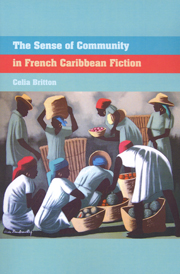Book contents
- Frontmatter
- Contents
- Acknowledgements
- Abbreviations
- Introduction
- 1 Restoring Lost Unity in Jacques Roumain's Gouverneurs de la rosée
- 2 Past, Future and the Maroon Community in Edouard Glissant's Le Quatrième Siècle
- 3 Living by Mistake: Individual and Community in Simone Schwarz-Bart's Pluie et vent sur Télumée Miracle
- 4 Singular Beings and Political Disorganization in Vincent Placoly's L'Eau-de-mort guildive
- 5 Conquering the Town: Stories and Myth in Patrick Chamoiseau's Texaco
- 6 Community, Nature and Solitude in Daniel Maximin's L'Ile et une nuit
- 7 On Not Belonging: Surrogate Families and Marginalized Communities in Maryse Condé's Desirada
- Conclusion
- Notes
- Bibliography
- Index
1 - Restoring Lost Unity in Jacques Roumain's Gouverneurs de la rosée
- Frontmatter
- Contents
- Acknowledgements
- Abbreviations
- Introduction
- 1 Restoring Lost Unity in Jacques Roumain's Gouverneurs de la rosée
- 2 Past, Future and the Maroon Community in Edouard Glissant's Le Quatrième Siècle
- 3 Living by Mistake: Individual and Community in Simone Schwarz-Bart's Pluie et vent sur Télumée Miracle
- 4 Singular Beings and Political Disorganization in Vincent Placoly's L'Eau-de-mort guildive
- 5 Conquering the Town: Stories and Myth in Patrick Chamoiseau's Texaco
- 6 Community, Nature and Solitude in Daniel Maximin's L'Ile et une nuit
- 7 On Not Belonging: Surrogate Families and Marginalized Communities in Maryse Condé's Desirada
- Conclusion
- Notes
- Bibliography
- Index
Summary
The theme of community is central to Jacques Roumain's Gouverneurs de la rosée. Manuel returns from a fifteen-year absence to find his village of Fonds-Rouge suffering from a life-threatening drought and split by a family feud which has divided the population into two camps; he resolves to find a new source of water and to reunite the people into the harmonious community that they used to be; and although (or because) he is murdered in the course of this, he succeeds on both counts. The community is thus placed throughout the narrative in relation to a leader who saves it: an archetypal hero, Manuel combines the roles of leader, saviour, and teacher, leading them from resignation and dissension to a new confidence in their ability to work collectively to change their lives for the better. Specifically, he teaches them not to rely fatalistically on the gods – either the Christian God or the vodou loas – but to take responsibility for their future; and to understand that they can only do this if they work together.
This double aim is symbolized in the ‘coumbite’: the traditional, originally African, practice of working collectively on each other's land. The novel opens with Bienaimé remembering the time before the drought and the feud: ‘A l'époque, on vivait tous en bonne harmonie, unis comme les doigts de la main et le coumbite réunissait le voisinage pour la récolte ou le défrichage’ (p. 13).
- Type
- Chapter
- Information
- The Sense of Community in French Caribbean Fiction , pp. 19 - 35Publisher: Liverpool University PressPrint publication year: 2010



